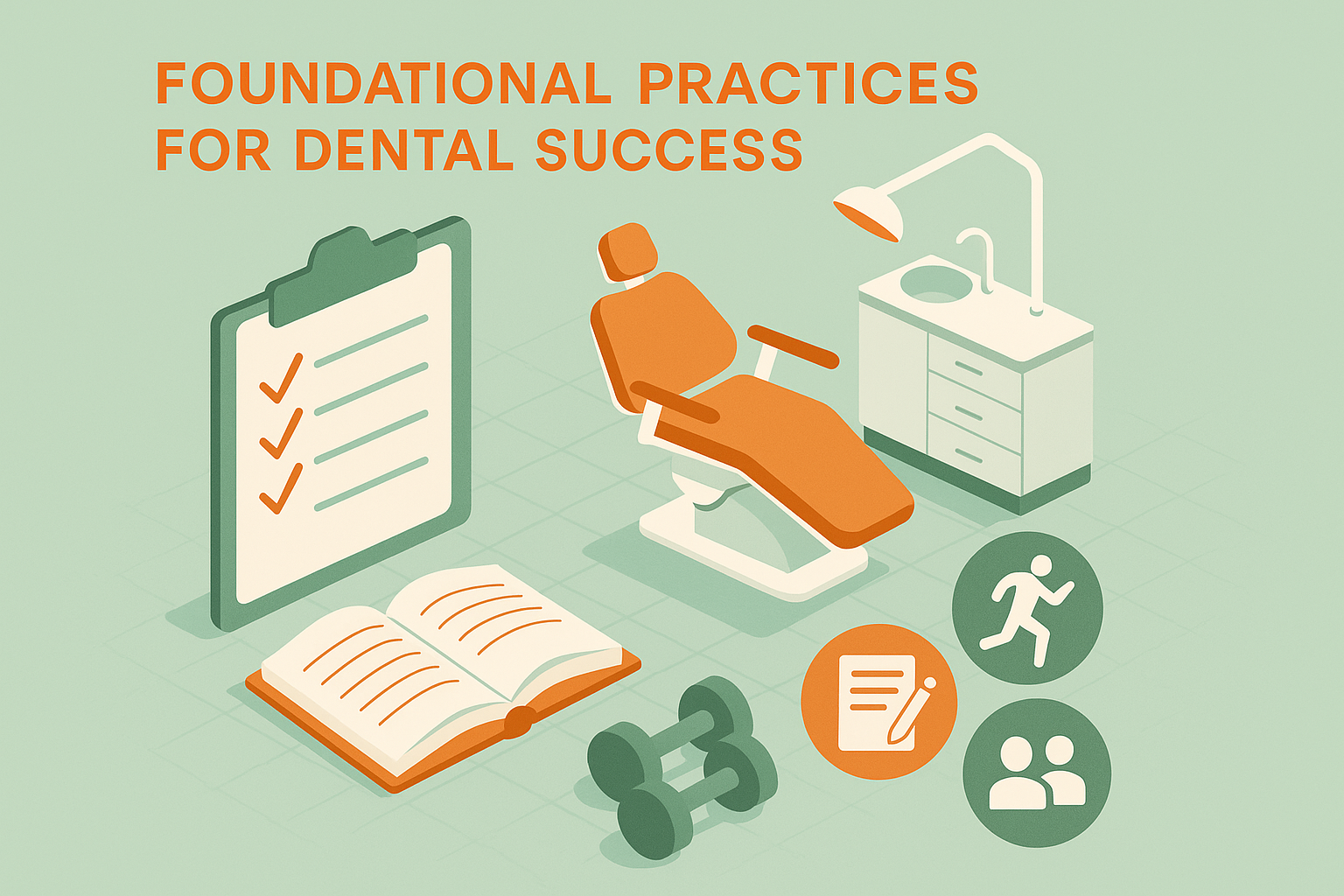10 Foundational Practices for a Successful Dental Practice
Running a thriving dental practice in Toronto or anywhere in the GTA requires more than clinical expertise. An efficient, goal-oriented practice built on sustainable daily habits sets successful dentists apart in one of Canada’s most competitive dental markets. This guide explores 10 foundational habits—ranging from operational systems to personal well-being—that can elevate your professional trajectory.
1. Establish a Robust Productivity System

The cornerstone of a successful clinic is efficient task and time management. A comprehensive productivity system helps align your clinic’s day-to-day operations with broader goals. Dentists in fast-paced areas like the GTA benefit particularly from adopting structured methodologies—such as David Allen’s Getting Things Done (GTD)—to manage workflows, reduce stress, and enhance staff coordination.
Start by developing checklists for common procedures, integrating cloud-based task trackers, and leveraging platforms like EBIKO Dental for streamlined ordering and supply tracking.
2. Commit to Regular Exercise

Regular movement is more than a lifestyle goal—it's a professional asset. Dentistry demands stamina, fine motor skills, and mental alertness. Exercise—whether morning stretches, strength training, or after-hours cardio—improves posture, counteracts musculoskeletal strain, and supports emotional resilience.
Clinicians may face extended hours of chairside work, so micro-exercises during breaks and ergonomic training also support long-term physical sustainability.
3. Dedicate Time to Daily Reading

Staying updated with the latest clinical advancements, material innovations, and patient care best practices is critical. Dedicate 30 minutes daily to professional journals, technique-focused case studies, or posts from innovation hubs like EBIKO Dental.
Reading facilitates better decision-making—both clinically and operationally—and ensures your practice stays ahead in a quickly evolving field. Consider subscribing to Canadian Dental Association (CDA) publications for compliance and best-practice insights, especially relevant within Ontario's regulatory environment.
4. Maintain a Weekly Journal

A weekly journal helps consolidate learning, analyze complex cases, and reflect on interpersonal-care moments within the clinic. Many high-performing dentists use journaling to capture insights from patient interactions, management hurdles, or even reactions to product usage—such as new dental burs or chairside innovations.
The practice provides continuity in professional development and emotional clarity—a necessary tool when juggling administrative and clinical roles.
5. Engage in Conversations with Experienced Professionals

No dentist works in a vacuum. Regularly connecting with mentors or experienced colleagues accelerates skill acquisition and fosters strategic thinking. Whether through online mentoring groups, local meetups organized by the Ontario Dental Association, or product-specific roundtables—such as clinical feedback sessions about diamond burs from EBIKO—community input can be transformative.
Building such networks also increases early access to career opportunities and trial-stage technology rolling out across Canadian practices.
6. Track Your Financial Transactions

Clinical excellence must be matched by financial oversight. Tracking major capital purchases—like intraoral scanners, rotary handpieces, or inventory from suppliers such as EBIKO's rotary instrument line—helps optimize operational margins.
Use software like QuickBooks, FreshBooks, or Dentrix-integrated tools to audit cash flows, forecast monthly expenses, and optimize bulk purchasing. In Ontario's urban markets, smart cost control can mean the difference between a marginal and thriving practice.
7. Set Boundaries for Distractions

With digital distractions and administrative multitasking, clinical focus can quickly fragment. Define office-hour screen-time rules, neutralize social media use inside the practice zone, and structure team huddles with clear boundaries and deliverables.
Installing systems that auto-alert on low inventory or delayed procedure steps—especially when using platforms like EBIKO Dental—can eliminate the guesswork and reduce operational clutter.
8. Establish a Consistent Sleep Schedule

Rest directly impacts focus, emotional regulation, and procedural precision. Irregular sleep paired with demanding schedules can erode energy over time. A disciplined sleep pattern enhances daily performance—from accurate impressions to successful restorations.
Enforce end-of-day shutdown rituals at the office and home—especially avoiding evening case documentation or online ordering past designated hours. Prioritizing rest leads to safer, more consistent clinical outcomes.
9. Undertake Major Projects
Thinking project-wise—rather than task-wise—drives transformational change. Instead of setting vague ambitions like “improve hygiene”, launch a six-week hygiene optimization spotlight: upgrade ultrasonic equipment, implement a recall system, or add new disposable tools for infection control.
Project planning develops leadership muscles, improves patient experiences, and enables measured return-on-investment reviews essential for long-term success in the GTA dental market.
10. Embrace New Experiences
Don’t resist experimentation. Trial new practice models—like mobile dental units or sedation services—or engage in continuing education beyond core CE requirements. Innovation exposure often comes by trial: trying equipment kits from EBIKO Dental starter kits or adopting emerging material systems can be eye-opening.
This spirit of exploration invites workplace satisfaction, internal growth, and helps distinguish your clinic in a saturated metropolitan environment.
Your Plan for Success
These ten foundational strategies are not just habits; they are competencies for sustainable success. Begin small—build one or two into your weekly rhythm—and gradually scale towards systemic integration. Whether you're launching a new clinic in Toronto’s East End or enhancing operations in Mississauga, applying these principles prepares you for excellence in both patient outcomes and personal fulfillment.

